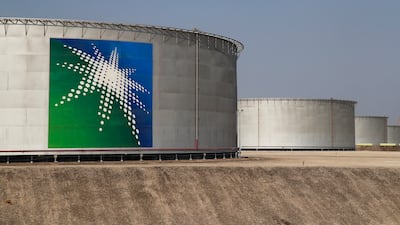Saudi Aramco, the world's largest oil-producing company, will not increase its production to 13 million barrels per day as was previously announced, and will instead maintain its maximum sustainable capacity at 12 million bpd.
The company made the decision after receiving a directive from the kingdom’s Ministry of Energy, Saudi Aramco said on Tuesday in a statement to the Tadawul stock exchange, where its shares are traded.
It did not provide other details, but said it will update its capital spending guidance when its full-year 2023 results are announced in March.
Aramco was asked by the Energy Ministry in March 2020 to increase its maximum output capacity to 13 million bpd amid a stand-off with Russia over market share.
The following year, the company's chief executive Amin Nasser said the “full capacity will be available by 2027 but it will come in increments”.
To achieve the 13 million bpd capacity, “we will focus on existing fields and will make the appropriate disclosure and announcements when we reach certain project milestones but it is going to come from existing and new fields, so it will be a combination of both”, he told the Energy Intelligence Forum at the time.
The change of plan is expected to take out a significant portion of the supply buffer that traders were expecting for later this decade, a gap that may be hard for others to fill. But maintaining the additional spare capacity is expensive, especially as oil demand is likely to slow in the future with the energy transition, Bloomberg reported.
Earlier this month, Opec forecast a decline in crude oil demand growth in 2025, but said fuel consumption would be driven by solid economic activity in China.
Global oil demand is expected to grow by 1.8 million bpd next year, down from Opec's estimate for this year of 2.2 million bpd, the group said in its monthly oil market report.
The decision not to raise production “might be cost driven, a desire to redirect revenues to the government instead of investing in new capacity, a new less optimistic outlook on future oil demand,” UBS strategist Giovanni Staunovo told The National.
It is also driven by “sufficient high spare capacity (around 3m bpd) and potential higher one in the future,” he said, adding the kingdom aims to achieve 50 per cent of its energy demand coming from renewables by 2030 “that would reduce their domestic demand for oil by 1 million barrel per day.”
The latest announcement is not expected to have any implication for oil prices in the near term as the production capacity was expected to come online by 2027, he added.
Oil prices were little changed on Tuesday.
Brent, the benchmark for two thirds of the world’s oil, was trading 0.64 per cent lower at $81.88 a barrel at 4.50pm UAE time.
West Texas Intermediate, the gauge that tracks US crude, was down 0.63 per cent at $76.30 a barrel.


